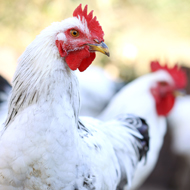Avian influenza reported in Fife

A suspected outbreak of avian influenza has been reported at a poultry farm in Fife.
A suspected outbreak of avian influenza has been reported at a poultry farm in Fife, the Scottish Government has confirmed.
Initial test results indicate the presence of a notifiable strain of avian influenza (H5N1) in chickens. The clinical picture suggests that it is a "Low Pathogenic strain" and further testing is underway to confirm.
In order to limit the spread of disease, the birds at the suspected premises will be humanely culled and a 1km Temporary Control Zone put in place. Within this zone, there are restrictions on the movement of poultry, carcasses, eggs, used poultry and manure.
Health Protection Scotland say there is a very low risk to human health, and Food Standards Scotland say there is no food safety risk for consumers.
Commenting on the case, BVA president Sean Wensley said: “This suspected outbreak is further evidence of the vital surveillance role played by frontline vets in protecting animal and, by extension, human health.
"We commend the veterinary surgeon involved in detecting the outbreak in Fife, which has enabled a swift and effective response by the Scottish Government and all other organisations involved.
“We urge poultry keepers and vets working in the area to remain vigilant and to report any concerns to their local Animal Plant & Health Agency (APHA) office. We would like to emphasise that there is no food safety risk to the public.”
Contact details for APHA can be found at https://www.gov.uk/government/organisations/animal-and-plant-health-agency/about/access-and-opening#scotland



 The latest
The latest